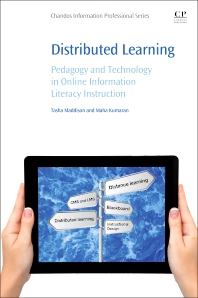Books in Library automation and networks
Books in Library automation and networks
- 1st Edition
- February 28, 2017
- Carl Gustav Johannsen
- English
- Paperback9 7 8 0 0 8 1 0 1 9 2 3 8
- eBook9 7 8 0 0 8 1 0 1 9 2 4 5

Staff-Less Libraries
- 1st Edition
- October 10, 2016
- Tasha Maddison + 1 more
- English
- Paperback9 7 8 0 0 8 1 0 0 5 9 8 9
- eBook9 7 8 0 0 8 1 0 0 6 0 9 2

Distributed Learning
- 1st Edition
- October 16, 2015
- Richard M Jost
- English
- Paperback9 7 8 0 0 8 1 0 0 1 5 3 0
- eBook9 7 8 0 0 8 1 0 0 2 1 6 2

Selecting and Implementing an Integrated Library System
- 1st Edition
- September 2, 2014
- Jose Luis Ortega
- English
- eBook9 7 8 1 7 8 0 6 3 4 7 2 2

Academic Search Engines
- 1st Edition
- September 30, 2013
- Steven Ovadia
- English
- Paperback9 7 8 1 8 4 3 3 4 7 1 5 6
- eBook9 7 8 1 7 8 0 6 3 3 8 1 7

The Librarian's Guide to Academic Research in the Cloud
- 1st Edition
- July 31, 2013
- Nancy Noe
- English
- eBook9 7 8 1 7 8 0 6 3 3 7 1 8

Creating and Maintaining an Information Literacy Instruction Program in the Twenty-First Century
- 1st Edition
- July 31, 2013
- Rebecca Lubas + 2 more
- English
- Paperback9 7 8 1 8 4 3 3 4 7 2 9 3
- eBook9 7 8 1 7 8 0 6 3 3 9 5 4

The Metadata Manual
- 1st Edition
- October 4, 2012
- Isto Huvila
- English
- eBook9 7 8 1 7 8 0 6 3 3 4 9 7

Information Services and Digital Literacy
- 1st Edition
- July 5, 2012
- Gail Staines
- English
- eBook9 7 8 1 7 8 0 6 3 3 0 7 7

Universal Design
- 1st Edition
- January 31, 2007
- Reg Carr
- English
- eBook9 7 8 1 7 8 0 6 3 0 9 9 1
